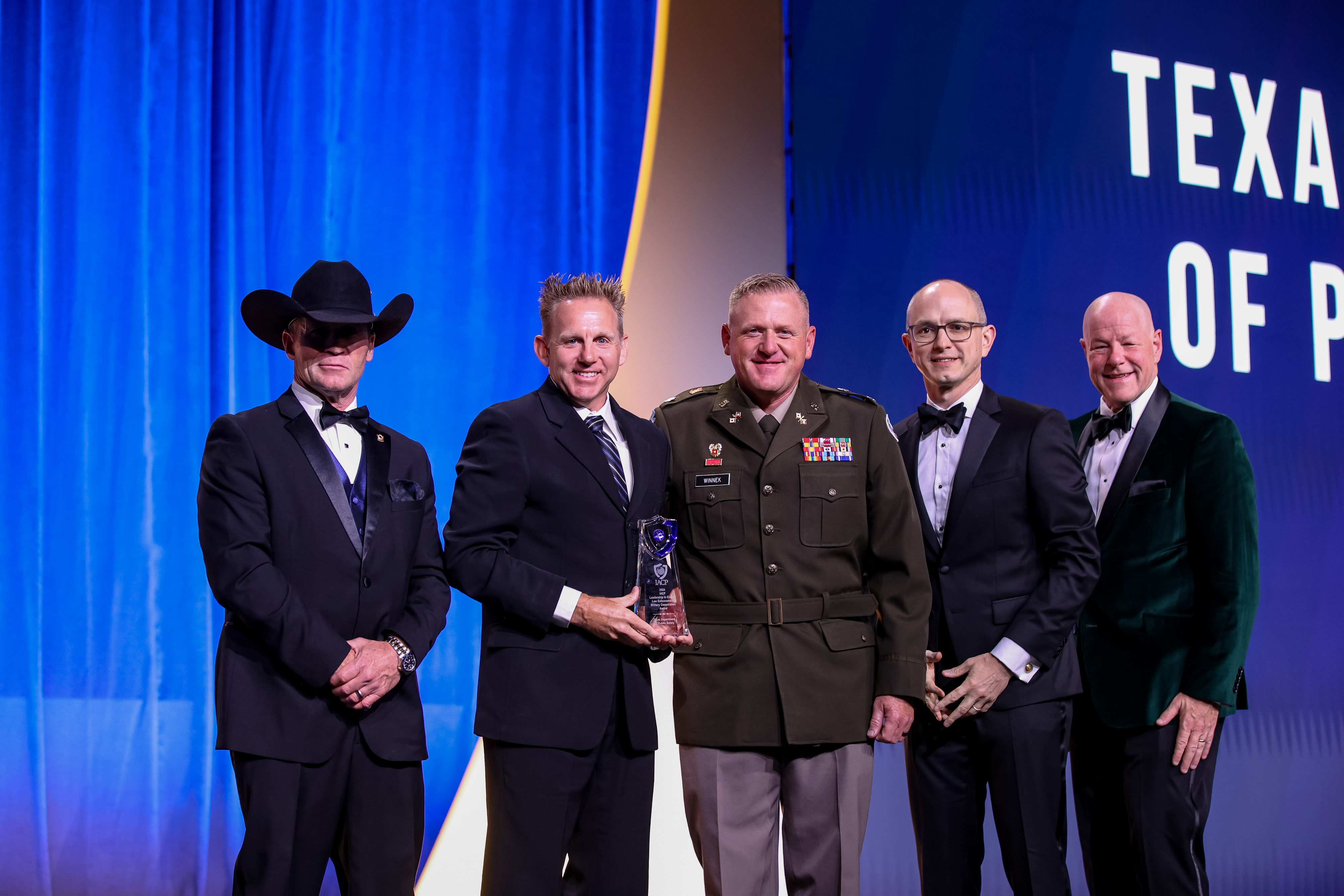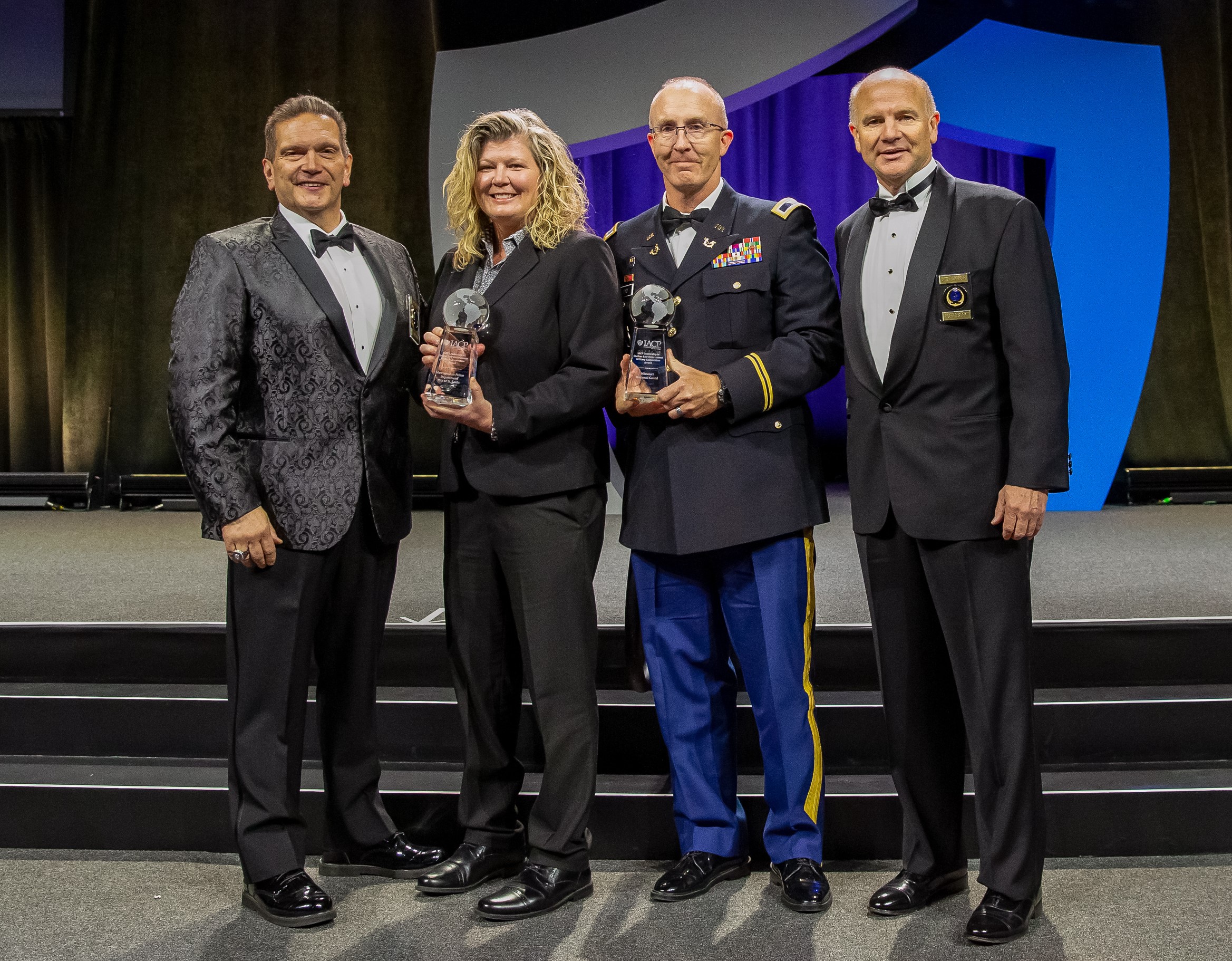IACP Leadership in Civilian Law Enforcement – Military Cooperation Award
The IACP Leadership in Civilian Law Enforcement/Military Cooperation Award recognizes excellence in cooperation between civilian and military law enforcement agencies.
The 2024 award nomination period is now closed. Complete the 2025 Awards Interest Form to receive information as it becomes available.
This award highlights the development of innovative joint efforts to improve public safety for both military and civilian communities.
For further information, contact [email protected].
2024 Winner
Texas Department of Public Safety

Following the 2021 deployment of Texans to secure the southern United States and Mexico border, the Texas Department of Public Safety (DPS) director, Steven McCraw, had to find a quick solution to address the complex nature of tracking the location of personnel across a vast operational area. After researching options, the Texas DPS implemented a Team Awareness Kit (TAK) to meet the challenges of maintaining active situational awareness of DPS personnel.
The Texas TAK gives leaders a no-cost common operating picture of personnel during a variety of operations and locations. The Texas TAK builds upon U.S. Department of Defense software using live-mapping GPS, aircraft, and sensors to enhance a real-time picture of where personnel are operating. Leaders now track more than 2,800 users from more than 40 agencies across Texas daily. The Texas TAK has been deployed to maintain situational awareness during border security operations, Capitol security operations, fugitive operations, tactical operations, and other special events.
With the use of the Texas TAK systems, Texas DPS leaders demonstrated exceptional skill by deploying a scalable and secure platform that prevents siloed communication systems from risking personnel. Leaders have strengthened multiagency interoperability by using technology to protect personnel during dangerous operations. For their foresight and problem-solving strategies, the Texas DPS is being awarded the Leadership in Civilian Law Enforcement/Military Cooperation Award.
2023 Winner
Korean National Police Agency, Republic of Korea

The Korean National Police (KNP) exemplify steadfast leadership in continually protecting U.S. and Korean security interests in South Korea. For more than 60 years, they have built a foundation of community policing and local partnerships. They encourage mutual respect between our countries with an appreciation for U.S. service member sacrifices in establishing a free society. This sustained focus has produced joint investigations between the Korean National Police and the U.S. Army Criminal Investigations Division and resulted in a 21% decrease in crimes against U.S. Army personnel and their families. Investigators are encouraged to work with their partners in finding innovative ways to solve and prevent crimes. The KNP National Commissioner General formalized agreements with the United States to sustain cooperation and partnerships at all levels. The partnership is now a leading model, and many other such agreements exist involving the Korean Prosecution Office and the Korean National Customs agencies.
2022 Winner
Cumberland County Sheriff's Office, North Carolina, and Fort Bragg Criminal Investigation Division

In the last year, the Cumberland County Sheriff's Office, in partnership with the Fort Bragg Criminal Investigation Division, implemented a plan to be innovative by creating task forces and hosting regular leadership meeting opportunities, to maximize the effectiveness of both agencies' missions.
In recognizing the importance of sharing law-enforcement sensitive information between both agencies, the Fort Bragg CID Office has seen a 45% increase in clearance rates for criminal cases. The Cumberland County Sheriff's Office shared their expertise through legal training to keep both agencies current with ongoing changes in the state and federal code.
The Cumberland County Sheriff's and the Fort Bragg CID Office have identified gaps within cooperation and intelligence gathering. By encouraging cooperation and continuous dialogue, they have built strong bonds and partnerships.
2021 Winner
The United States Capitol Police & The District of Columbia National Guard
On January 6, 2021, the United States Capitol was stormed by rioters. The United States Capitol Police (USCP), along with the District of Columbia National Guard forces and other metropolitan police forces, responded and assisted in restoring order. Anticipating possible further disturbance actions, the DC National Guard and the U.S. Capitol Police secured the Capitol Grounds days prior to the Inauguration. A Joint Task Force was created for the entire National Capital Region (NCR), and specifically Task Force Capitol Grounds were created between the DC Guard and the USCP. The results of this collaboration included streamlined requests for National Guard forces within the U.S. Capitol, enhanced interagency coordination and information sharing, enhanced threat and intelligence sharing, and joint security assessments and recommendations addressing current and future security concerns. The strategic value of this operation and lessons learned will have a positive impact on future joint civilian and military law enforcement operations for the protection of our homeland.
2020 Winner
The Fujairah Police General Headquarters and the Fujairah Crisis and Emergency Team

Because of its proximity to the Indian Ocean, the Emirate of Fujairah is no stranger to natural disasters and crises such as seasonal cyclones, seismic activity, and severe flooding. This has led the Fujairah Police General Head Quarters (FPGHQ) to be continuously prepared in disasters and crises operational procedures. In 2018, heavy rainfall and flooding led the FPGHQ to partner with the Fujairah Crisis and Emergency Management Team (FCET) to coordinate and implement the United Nations created My City Getting Ready program. To effectively implement the program, the FPGHQ and the FCET have worked closely to create a communications plan, develop innovative solutions, and create focus sessions for strategic planning and evaluating. From their partnership and program, both agencies have learned how to more effectively deal with large scale crises, coordinate with each other, increase both community and staff satisfaction, improve their society’s overall sense of security, and minimize the financial impact and loss of life in their community.
2019 Winner
St. Louis, Missouri, Police Department and Missouri National Guard
In 2017, St. Louis City experienced a period of civil unrest after a not-guilty verdict in a police-involved shooting was announced. During the demonstrations and the subsequent after-action reviews, the Missouri National Guard recognized how beneficial the SLMPD’s Real Time Crime Center was for the entire St. Louis region. The two agencies met to discuss a potential partnership between the organizations. As a result, a decision was made that the Missouri National Guard would place a full-time analyst in the SLMPD’s Real Time Crime Center. This would provide the SLMPD with access to the broader intelligence community, as well as new training and educational resources. Additionally, the SLMPD would contribute to the Missouri National Guard’s Counter Drug Program; a mutually beneficial partnership. When cooperation with other military entities is necessary, access to the Missouri National Guard contacts has proven to be invaluable to the SLMPD. The Missouri National Guard analyst and the Real Time Crime Center has led to 1,756 arrests; 4,294 charges resulting from the arrest and 1,043 stolen vehicles, 243 firearms, and vast amounts of stolen property and narcotics recovered.
2018 Winner
Texas Department of Public Safety
First conducted in 2015, the Texas Search and Rescue Exercise (SAREX) is a joint initiative developed by the Texas Department of Public Safety, Air Operations Division with support from the Texas Army National Guard and Texas Task Force 1 to address collaborative challenges in border security operations and natural disaster response. By pooling resources, the state of Texas can better respond to natural disasters and border security issues. SAREX serves as an effective and successful model of civilian-military integration, which can make a difference and save lives, which was evident in the successful deployment of Federal, Military, and local assets during the Hurricane Harvey relief efforts in 2017. Forming and maintaining relationships have proven to be a key to success, and annual exercises are critical to ensuring that inter-agency coordination takes place efficiently and that communications plans are viable. This is only possible by planning, coordinating and conducting exercises such as SAREX.


